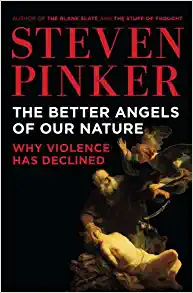Written by Greg Ellifritz
I’m going to start by saying that this is a massive book containing nearly 700 pages of text followed by almost 100 pages of reference notes. I’m also going to state that book is an intellectual masterpiece that contained ideas that were slightly more advanced than my limited mental capacity could fully process. If you are looking for a light summertime read, this isn’t it. But if you want the absolute best research about how the concepts of violence have changed through the centuries, there is none better.
The author’s basic premise is that every aspect of violence has declined steadily over time. Contrary to what is reported by the news media, violence is now at a historic low. The book starts out examining the civilization process as our ancestors changed from nomadic hunter/gatherers to larger tribes and city states. This civilization process started the trend, reducing violence to 1/5 of previous levels.
He then shows how commerce and the development of larger civilizations in the middle ages reduced levels of violence even more. This trend was followed by one in the 18th and 19th centuries when practices like torture, slavery, witch hunts, and dueling were outlawed, leading to a further reduction in violence.
He ends by explaining the most recent trends of violence decreasing at individual levels, tracking reductions in corporal punishment, spousal abuse, and racially motivated violence, along with the rise of women’s and civil rights.
He provides ample proof that violence has steadily declined in every measurable metric. After proving that we are becoming less violent as a society, he spends several hundred pages describing how and why he believes people become violent and suggests some solutions involving some complex derivations of game and chaos theory. It gets a little heady in these chapters.
The book is an interesting contrast to Lt. Col. Dave Grossman’s research on societal violence. Grossman states that violence is currently at an epic level. I think Pinker proves him wrong. Although I like Grossman’s overall message, his statistics are blown out of the water by Pinker’s work.
If you study or teach any of the arts of violence or self protection, this book belongs on your shelf. It is available HERE.
If you enjoyed this book, you may also like The Rational Optimist by Matt Ridley. He expresses many similar ideas and is one of the only other prominent authors who are optimistic about the fate of the human condition.


